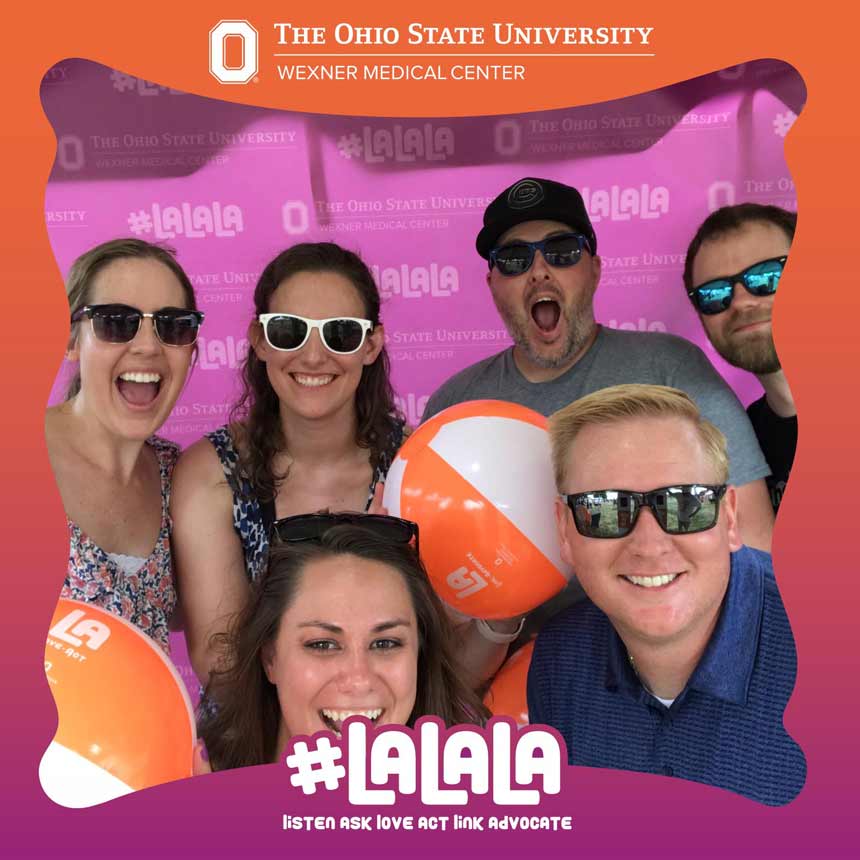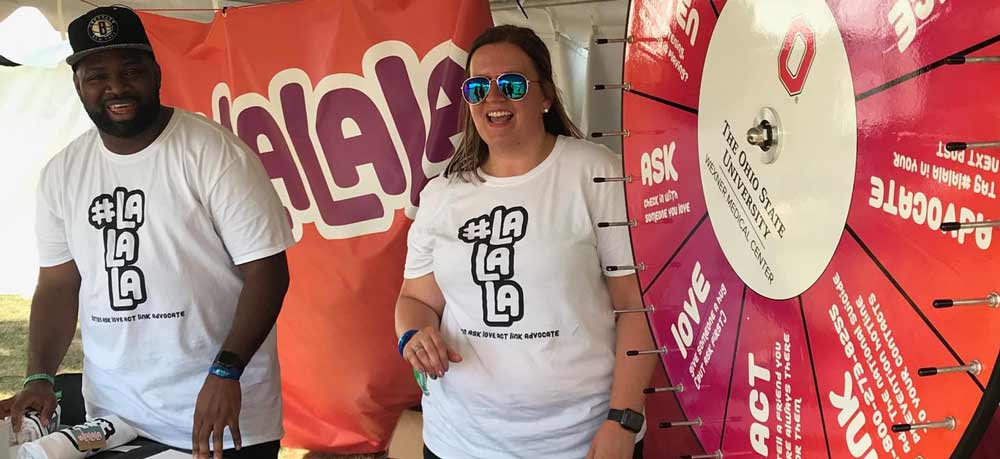What is #LALALA?
#LALALA stands for Listen. Ask. Love. Act. Link. Advocate. It’s our campaign to help raise awareness about how you can help create a culture of empathy and encouragement for those struggling with depression and thoughts of suicide. #LALALA reminds us that we all have the power to help. The Ohio State University Wexner Medical Center’s Department of Psychiatry and Behavioral Health is the beneficiary of proceeds from the annual WonderBus Festival designed to raise awareness about important mental and behavioral health and wellness issues.
Listen. Ask. Love. Act. Link. Advocate.

Listen
The first and easiest step to take when you are worried that someone you know might be suffering from depression is to simply listen. Validate their feelings by telling them you want to hear what’s going on without judgement. Listening encourages people to open up more, so that they tell you about signs of depression, like hopelessness, insomnia, persistent sadness, or suicidal thoughts.
Ask
Encourage conversation by asking questions; this shows that you care enough to know more about their struggles and depression. Specifically ask: “Are you thinking about killing yourself?” This is one of the most important questions because asking it is proven to decrease – not increase – suicidal thoughts. Asking about the possibility of suicide may save the person’s life.
Love
Listening and asking are acts of love. Listening with compassion and empathy and without dismissing or judging further reflects love. That feeling of being loved may help someone find the confidence to reach out for help from you, or experts.
Act
Keep a person in crisis safe. Ask them if they know how they would hurt themselves, and then separate them from anything they could use to accomplish it. Work to put time and distance between the person and their chosen method, especially dangerous items like firearms and medications. Stay with the person until the crisis passes or they are connected to professional resources that can help them.
Link
If you think someone might be in immediate danger, don’t hesitate to call 911. Link them to the National Suicide Prevention Lifeline at 1-800-273-TALK (1-800-273-8255) and to professional mental health services. Know that mental health treatment definitely works – research shows it decreases depression and reduces suicide. And link them to other people who can provide support – research has also shown connectedness with others acts as a buffer against hopelessness and psychological pain. And remember to follow up after the immediate crisis passes, and repeat: Listen, Ask, Love, Act.
Advocate
Get informed and get involved. Start conversations to reduce the stigma. Everyone can help raise awareness about the suicide epidemic (each day nearly 130 people in our country die by suicide) and about suicide prevention. Advocate for better access to mental health care. Advocate for more resources and treatments. Advocate for more funding for research to better understand and treat depression and suicide.WonderBus 2019
#LALALA resources
The Ohio State University Department of Psychiatry and Behavioral Health offers personalized and compassionate care for mental and behavioral health conditions.
Mental and Behavioral Health Outpatient Care
614-293-9600
Individuals looking to develop skills to advance their mental and behavioral well-being can access outpatient services including a comprehensive evaluation, diagnosis from a qualified clinician and implementation of an individualized treatment plan. Specialized services are also offered for patients experiencing symptoms of depression, adjustment reaction, obsessive-compulsive disorder, psychosis, anxiety disorders, sexual dysfunction, PTSD and trauma.
Partial Hospitalization Program and Intensive Outpatient Programs
614-293-9560
These programs can act as a bridge to help a person transition from an inpatient setting to an outpatient community setting for treatment, or for individuals who require more than the conventional outpatient level of care but do not need a secured unit or 24-hour care. They can also assist a person who is struggling to cope with their symptoms with outpatient therapy alone but does not require inpatient hospitalization.
Crisis Management and Acute Inpatient Care
614-293-9600
Available 24 hours a day, seven days a week, this service provides emergency stabilization, diagnosis and initial stages of treatment for conditions such as anxiety disorder, post-traumatic stress disorder, psychosis and severe mood disorder. Stabilization is particularly important if there is a risk for personal harm (including suicide risk) or injury to others.
Drug and Alcohol Addiction Treatment Services
614-257-3760
We recognize that each individual’s experience with addiction is unique. Our highly trained team of addiction specialists has experience in addressing both the psychological and physical effects of addiction. After a thorough assessment to understand the physical, psychological and social elements of the addiction, we will help select the type and level of treatment best suited for the patient to overcome old habits and break the grip of addiction.
Women’s Behavioral Health
614-293-9600
Our multidisciplinary center offers care to women experiencing stress or stress-related illness during life events that are unique to women. We provide women with state-of-the-art treatment for mood and anxiety disorders, sexual health, substance use disorders and stress, with a special emphasis on pregnancy, the postpartum period, gynecologic and breast cancers, menopause and the menstrual cycle.
Neuropsychology Clinic
614-293-9600
For evaluation: 614-293-8552
Ohio State is at the forefront of pioneering neurological therapies and technologies that can help relieve symptoms of some mental health disorders. Advanced treatments such as transcranial magnetic stimulation (TMS), electroconvulsive therapy (ECT) and deep brain stimulation (DBS) are providing innovative, effective therapies for patients with physical and mental conditions that might not have responded well to antidepressant medications or other therapies.
STRIVE
614-293-7827
The Suicide and Trauma Reduction Initiative for Veterans (STRIVE) has established itself as one of the leading research sites for clinical trials on suicide treatment, prevention and intervention. Our nationally recognized treatment programs and workshops conducts research, education, outreach and advocacy for improving the lives of military personnel, veterans, first responders and their families.
EPICENTER
614-685-6052
Specialized, phase-specific treatment for young adults early in the course of a psychotic illness, such as psychosis NOS, schizophrenia, schizoaffective disorder (with psychotic features) and bipolar disorder (with psychotic features). Signs of these illnesses can include trouble with reality testing, paranoia, hallucinations, delusions, disorganization, odd behavior or thinking, isolation, emotional changes and difficulty with work or school.
Stress, Trauma and Resilience (STAR)
614-293-7827
The STAR Program focuses on identification, education and treatment of those who have survived trauma and the people who support them, as well as community members who work in health care, public safety, the military and similar high-stress professions. Our program offers internal training and support in the workplace to help you and your staff cope with trauma and everyday stress.
Help us continue our efforts to break the stigma around mental and behavioral health
Voices of Resilience Podcast Series: Hear from our Experts
This podcast series is about influential voices and top thought leaders sharing personal stories of navigating stress, trauma and adversity.
#22 Rock ‘n’ Roll, Addiction and Redemption with Matt Wilkof
Matt took his first sip of alcohol at age 9 and was only 15 years old when he lost his father to suicide, opening up a journey of addiction, grief, redemption and resilience. This is his inspirational life story told through his words and music.
Listen to this episode
#11 Can We Achieve Zero Suicides? with Dr. Craig Bryan
Dr. Craig Bryan, Professor of the Stress, Trauma, Adversity and Resilience (STAR) program at The Ohio State University, is a world renowned suicide prevention researcher and innovator who helps people find resilience in their darkest times. His talk will focus on his hope that we have a future with zero suicides. His research combines treatment, planning and therapies to greatly reduce suicide compared to typical treatment methods. Hosted by Rick Milenthal.
Listen to episode
#5 Is There a Cure for Suicide? with David Grzelak
David Grzelak and his wife, Elizabeth, have been led to a mission of helping others after experiencing the loss of their teenage son to suicide. Dr. Luan Phan of The Ohio State University speaks about how we can all combat our nation’s suicide epidemic together. Hosted by Rick Milenthal.
Listen to episode





